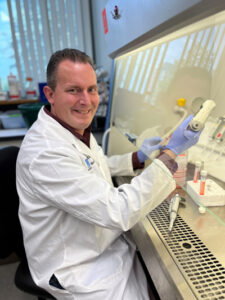Since 2005, our Seed Grant Program has fostered an environment for research to bloom. As we mark 20 years since our first cohort of grantees, it is more exciting than ever to look back and see all that is being accomplished.
 Dr. Ethan Abel, a 2021 Hirshberg Foundation Seed Grant recipient, has continued to make significant strides in pancreatic cancer research. Now in his sixth year as an Assistant Professor at Roswell Park Comprehensive Cancer Center, Dr. Abel leads a dedicated research lab focused on uncovering new mechanisms of therapeutic resistance in pancreatic ductal adenocarcinoma (PDAC).
Dr. Ethan Abel, a 2021 Hirshberg Foundation Seed Grant recipient, has continued to make significant strides in pancreatic cancer research. Now in his sixth year as an Assistant Professor at Roswell Park Comprehensive Cancer Center, Dr. Abel leads a dedicated research lab focused on uncovering new mechanisms of therapeutic resistance in pancreatic ductal adenocarcinoma (PDAC).
The Hirshberg Foundation’s Seed Grant was crucial in launching Dr. Abel’s independent research career. His early work understanding how the HNF1A protein impacts drug resistance in pancreatic cancer led to a prestigious National Institutes of Health (NIH) R37 grant. This grant supports his work in understanding the novel roles of HNF1A, a transcription factor in pancreatic cancer, and new proteins of interest with underappreciated roles in pancreatic cancer.
Dr. Abel’s lab is preparing two research manuscripts, one of which is under review, based on findings supported by the Seed Grant and R37 funding. His team includes a technician and two Ph.D. students, one of whom will defend her thesis this summer, an exciting milestone for the next generation of pancreatic cancer researchers.
With his R37 grant, Dr. Abel is investigating how HNF1A contributes to resistance against KRAS-targeted therapies. Once deemed "undruggable," KRAS has now become a viable target, opening the door to new treatment strategies. However, as with many targeted therapies, resistance remains a challenge. Dr. Abel’s research aims to uncover how HNF1A interacts with BRD4 and BET inhibitors to drive resistance, with the goal of identifying ways to overcome these barriers.
Beyond drug resistance, his lab is also exploring the potential role of HNF1A in pancreatic cancer metastasis, illustrating how this protein may contribute to disease progression. These discoveries could open new avenues for therapeutic intervention, potentially improving outcomes for patients with advanced pancreatic cancer.
Dr. Abel is optimistic about the future of pancreatic cancer research. With the recent breakthroughs in KRAS and pan-RAS inhibitors, he envisions a shift in treatment paradigms, potentially replacing or enhancing traditional chemotherapy. He anticipates that much of the field’s focus will be on understanding and overcoming therapy resistance in the next five years, ensuring that these promising new treatments can benefit more patients.
His work exemplifies the impact of private funding in fostering innovative research that leads to major scientific advancements. As the Hirshberg Foundation celebrates 20 years of our Seed Grant program, Dr. Abel’s career stands as a testament to the power of early funding in accelerating progress toward a cure.
Thanks to your support, we’ve been planting seeds of hope through our Seed Grant Program for 20 years. It’s a delight to watch research grow from the lab to the clinic and bloom into clinical trials and new treatment options.
Help us continue to sow seeds of hope for a cancer-free future, donate today.